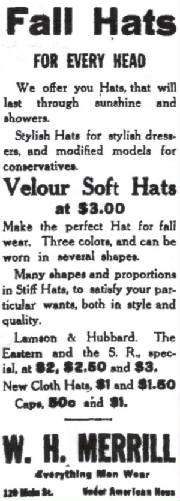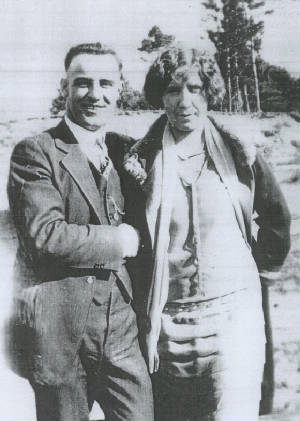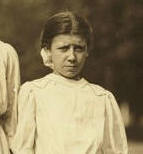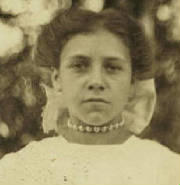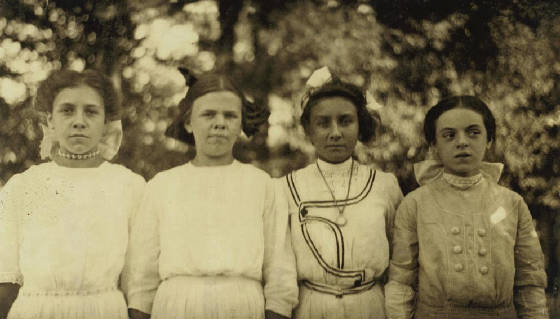
Lewis Hine caption: Comparison of Ages: Left: Marion Deschere, just passed 13 years. Helps sister in mill “some.” Next is Mildred Greenwood, “going on 14.” Goes to school. Next is Mamie La Barge, 13 years, but said 14 years. Right end is Rosina Goyette, said 14, probably 12 or 13. Mamie and Rosina have steady jobs. Location: Winchendon, Massachusetts, September 1911.
“Aunt Marion was always dressed up. That was her thing. In fact, in the picture that you showed us, you could tell that she was fashionable even at that age. She’s wearing pearls.” -June Rhodes, niece of Marion Deschenes
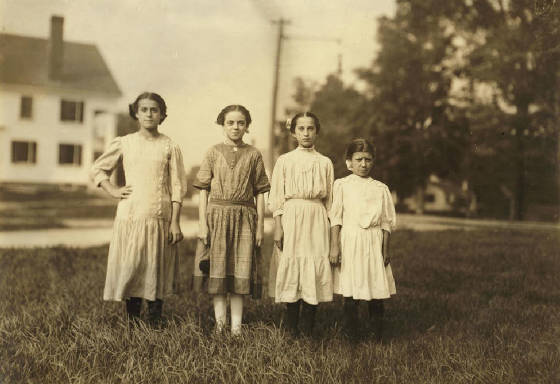
Lewis Hine caption: Comparison of ages: On right end is Mary Deschene, admitted 11 years, helped sister spool all summer in Glenallen Mill. Next her is Lumina Demarais, admitted 12 years, and doffing all summer in Spring Village Mill. Next is Rosina Coyette, said she was 14 but Mr. Hine doubted it; has steady job doffing and spinning in Spring Village Mill. Left end is Eva Caonette, spinner in Spring Village Mall, said she was 14 but may not be. Location: Winchendon, Massachusetts, September 1911.
“She was always up early before my brother and I got up, and she would always hide somewhere downstairs when she heard us coming. The first thing we had to do was find Meme, before we had breakfast. She’d be behind a door or in a closet.” -Edward Bigelow, grandson of Mary Rose Deschenes
According to detailed information compiled over the years by Marion Deschenes, and other records, the family moved on September 5, 1912, to Fitchburg, a thriving manufacturing city about 15 miles south of Winchendon. It had been almost exactly a year since Marion and her sister had been photographed by Lewis Hine. Their parents, Zoel and Amanda (Belanger) Deschenes, natives of Quebec, married in Greenville, New Hampshire in 1890, where he worked at the Columbian Manufacturing Company, a large textile mill. They had all of their nine children there, including Marie Anne (later called Marion), born on April 24, 1898, and Mary Rose (called Rose), born on March 12, 1900. They moved to East Jaffrey, New Hampshire on August 15, 1908, and then to Winchendon on September 29, 1910.
The day they moved into their rented home in the Cleghorn section of Fitchburg, the local newspaper advertised velour hats from $3.00, jelly glasses for 33 cents a dozen, and a five-cent matinee for ladies and children featuring a performance by Colonel Sam Holsworth, “the 82-year-old tenor.”
Rose married Edward Pinard in 1928. They had four daughters. She passed away in Fitchburg on January 4, 1976, at the age of 75. Marion never married. She passed away in Fitchburg on January 10, 1988, at the age of 89. Thanks to obituaries found in the Fitchburg Sentinel digital archives, I was able to contact several descendants almost immediately.

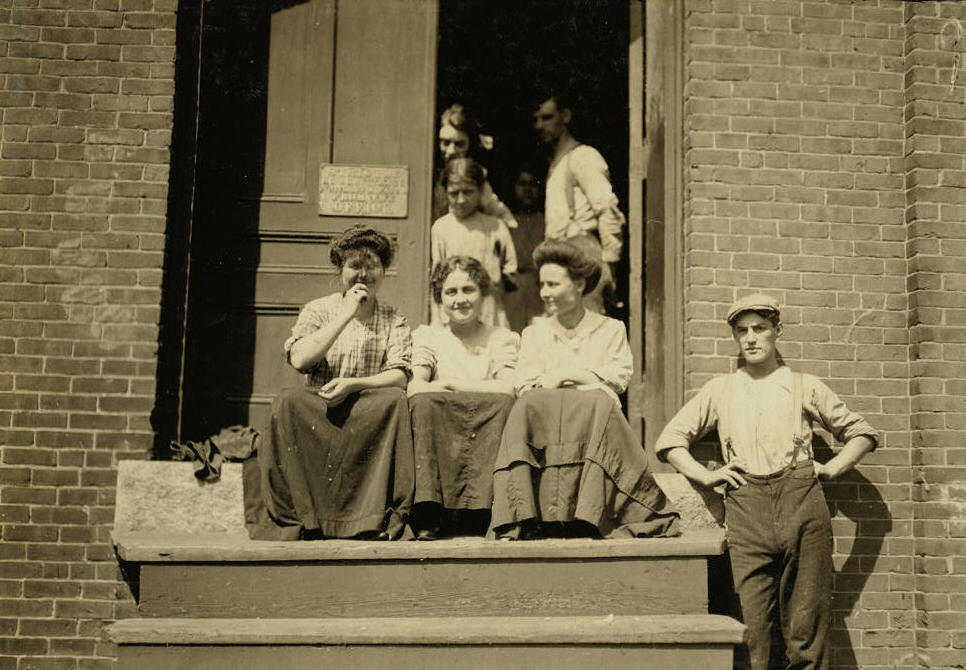
Lewis Hine caption: In doorway is Mary Deschene, 11 years old. Helper in Glenallen Mill. Location: Winchendon, Massachusetts, September 1911.
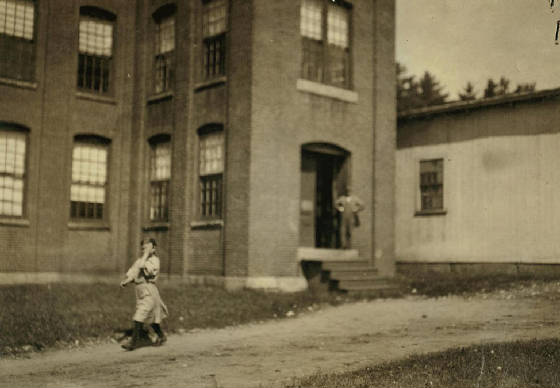
Lewis Hine caption: One of the young helpers in the Glenallen Mill. Location: Winchendon, Massachusetts, September 1911.
Edited interview with Jacqueline Bigelow, daughter of Mary Rose Deschenes; Edward Bigelow, Jacqueline’s son; and June Rhodes, niece of Mary Rose Deschenes and Marion Deschenes. Interview conducted by Joe Manning (JM) on March 28, 2009.
JM: When were each of you born, and how are you folks related to Marion and Rose?
June: Aunt Rose and Aunt Marion were my father’s sisters. My father was Joseph. I was born in 1925.
Jacqueline: Rose was my mother and Marion was my aunt. I was born in 1933.
Edward: I am Jacqueline’s son, so Rose was my grandmother, and Marion was my great-aunt. I was born in 1964.
JM: Jacqueline, what did you think when you saw the picture of your mother? Did it surprise you?
Jacqueline: Yes, I had never heard about it.
JM: Did you recognize her?
Jacqueline: Yes, I looked like her at that age.
JM: Did you know that she had lived in Winchendon?
Jacqueline: No. But when I mentioned it my son, he said, ‘Oh yes, she lived there.’
JM: How did you know, Ed?
Edward: I knew it because I had something that Aunt Marion had written long ago about the family. So when you sent me the pictures, I found it. She was sort of the family historian back then. She wrote that my great-grandparents, Zoel and Amanda, were married in Greenville, New Hampshire in 1890. All of the children were born in Greenville. I have a record of Zoel working at the Columbian Mill in Greenville (Columbian Manufacturing Co.). The family moved to East Jaffrey in August of 1908, and then to Winchendon in September of 1910. Amanda had two sisters who had already moved there. Then they moved to Fitchburg in September of 1912.
June: I was surprised by the pictures. My reaction was that if my two aunts worked in the mill there, that my father must have also worked there, and perhaps some of the other children. When they went to Fitchburg, my father worked in the Parkhill Mill, which was owned by the same people who owned the mill in Winchendon. (Joseph N. White, owner of the two mills in Winchendon where Hine took his pictures, was on the board of directors of the Parkhill Manufacturing Company in Fitchburg.)
JM: They also owned several mills in Jaffrey. What do you think about the fact that the pictures were used to influence the passing of child labor laws? Do you feel sorry for them?
June: Yes, because the children had to go to work at an early age. They must have really needed the money. Aunt Rose was only 11 years old, and that’s kind of young to be working in a factory. It must have been pretty rough. I can remember my father saying that he only went as far as the fifth grade, and he had to leave to go to work.
Jacqueline: I didn’t realize that they worked that young. My mother never talked about it.
JM: When did Rose die?
Jacqueline: In 1976, in Fitchburg.
JM: Where had she been living then?
Jacqueline: On Franklin Road, in Fitchburg. They owned the house.
JM: Who did she marry?
Jacqueline: Edward Pinard.
JM: When?
Jacqueline: 1928.
JM: Do you know why they moved to Fitchburg?
Edward: My great-grandfather, who was Rose and Marion’s father, had brothers that lived in Fitchburg, so that might have been the reason.
JM: Do you know when the family came to the US?
Edward: Between 1881 and 1890. Both my great-grandparents appear in the 1881 Canada census, and were married in New Hampshire in 1890.
JM: When the family moved to Fitchburg, where were they actually living?
Edward: On Clarendon Street, in the Upper Cleghorn section (Cleghorn was a French Canadian neighborhood).
JM: Would that have been near a factory?
June: Oh, probably a mile or two. They would have walked to work then.
JM: Jacqueline, where was the first house that your parents lived in after they got married?
Jacqueline: Probably the house on Clarendon Street where my grandparents lived.
JM: Was your father a mill worker?
Jacqueline: He was a steam fitter. He worked for Jennison for several years (Jennison Plumbing Company in Fitchburg).
JM: Did your mother work at the mill after she got married?
Jacqueline: Not that I know of. I don’t think she worked when she started having the children. That was in 1929, when my sister Rita was born.
JM: Is Rita still alive?
Jacqueline: No. My mother had four children, all girls, and Janet is the only other one still living.
JM: Where was the next house your mother lived?
Edward: That would be on Franklin Road, a few minutes walk from the house on Clarendon Street.
Jacqueline: I think I was five years old when we moved there.
JM: Could you walk into downtown Fitchburg?
Jacqueline: No, that was quite a ways. We had to take a bus. We didn’t have a car.
JM: What kind of house was it?
Jacqueline: A single family house. We had about six rooms.
JM: What was your mother like?
Jacqueline: She was a quiet woman. She had a nice, normal life.
JM: Did she have hobbies or special interests?
Jacqueline: My parents didn’t have too many outside interests. She just brought up the children. She was a good cook.
JM: Was your mother in close contact with her brothers and sisters?
Jacqueline: We used to see them quite a bit, especially Aunt Yvonne and Aunt Marion. They were the closest sisters.
JM: Where did you go to church?
Jacqueline: St. Joseph’s.
JM: Was that the French Catholic church?
Jacqueline: Yes. I also went to St. Joseph’s School, through the eighth grade.
JM: What was your first job as an adult?
Jacqueline: After I graduated from high school, I was a secretary at Great American Plastics. I stayed there four years, and then I went to work for the state unemployment office. I worked there eight years, and then after I married, my husband and I moved to Albany (NY). He had been transferred there. We came back about 18 months later, and I stayed home with the children for 15 years. Then I went back to work, for New England Telephone. I worked in the office.
JM: How was your Aunt Marion different from your mother?
Jacqueline: Well, she never married. She lived with my Aunt Yvonne for several years. And when Yvonne got married, she continued to stay with her. Aunt Marion was a salesperson at Baylin’s Fur Shop in Fitchburg.
June: She had a big clientele there, people who went only to her.
JM: Did she have any perks, such as getting to wear their furs?
Jacqueline: Yes, and she liked that.
JM: Was she fashionable?
Edward: Very, always dressed to the nines. Never saw her in pants. Always had her nails done, and she wore jewelry.
JM: Would any of those things describe your mother, Jacqueline?
Jacqueline: Well, she wore nice clothes.
JM: Do you remember your family being financially secure?
Jacqueline: Yes, most of the time.
JM: What was your relationship with Aunt Marion?
Jacqueline: She visited a lot, and we liked her.
JM: When did she die?
Edward: January 1988. She would have been 90 in a few months.
JM: Was she active in her last years?
Edward: Enough, I guess. She was not one to sit at home. She would go down to the little community center in her building a lot and visit with the other people. She never drove.
Jacqueline: My mother didn’t drive either. They never had a car. My father didn’t drive either.
JM: Did that make a difference to you that your parents didn’t have a car?
Jacqueline: I never missed it, because we never had one.
JM: But didn’t a lot of the parents of your friends have cars?
Jacqueline: No, not many.
June: I knew my Aunt Marion better, although I knew Aunt Rose very well, because I used to stay with my grandparents when I was young, and my mother and father both worked. They lived upstairs over my grandparents, so we were all pretty close. Aunt Marion was always dressed up. That was her thing. In fact, in the picture that you showed us, you could tell that she was fashionable even at that age. She’s wearing pearls.
Edward: That got a lot of laughs when I showed the picture to my cousins, the fact that she was wearing a pearl necklace to a sweatshop.
JM: Actually, on that day, she was dressed for church. Hine took a lot of the photos in Winchendon on Sunday.
Jacqueline: There’s a picture of her taken about 1945, and she’s still got the pearls around her neck.
June: Aunt Rose was a real mother and homemaker, and Aunt Marion was a fashion person, but she mothered everybody in the family. My mother always said the Aunt Marion could never find a man that really suited her. She always found something wrong with whatever man she met.
JM: Maybe she could never find a man who could afford to buy her pearls.
Edward: That’s really funny.
June: I don’t think she was looking for that. She was just looking for the perfect man.
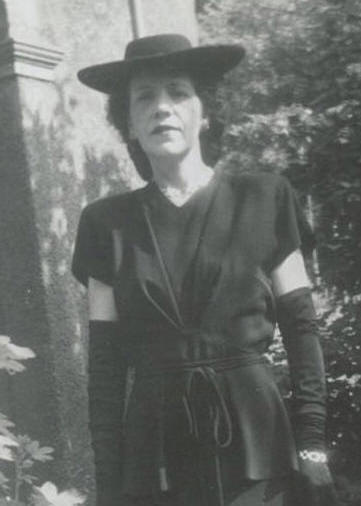
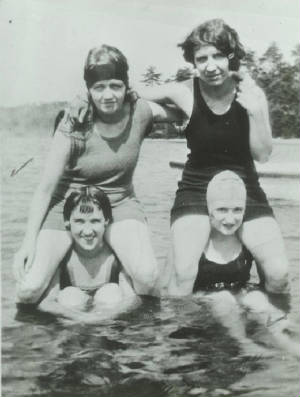
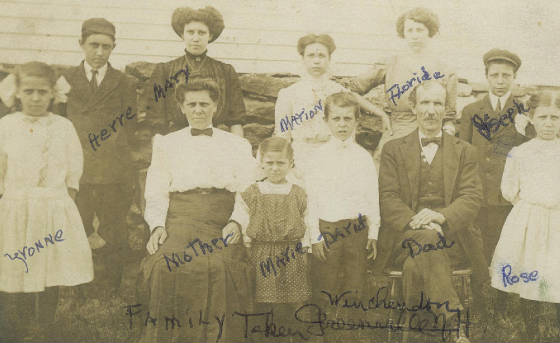
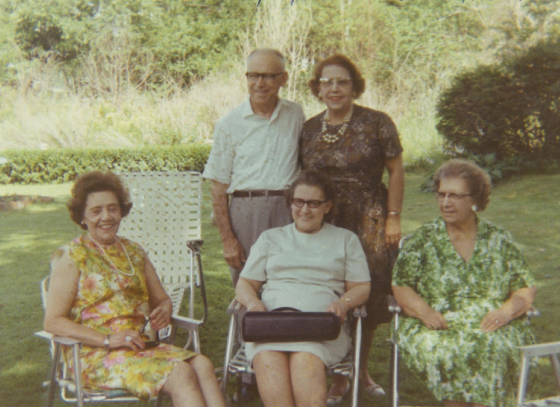
Interview continued:
Edward: I was 11 when my grandmother Rose died. I loved when she came to visit. She often stayed for a week at a time. She was always up early before my brother and I got up, and she would always hide somewhere downstairs when she heard us coming. The first thing we had to do was find Meme, before we had breakfast. She’d be behind a door or in a closet. Then we’d have breakfast together, but we didn’t talk much. Like my mother said, she was kind of quiet. I remember that if she was on the phone with Aunt Marion, she would speak French. I’d ask her what she was saying, and she wouldn’t tell me.
June: My grandparents always spoke French.
Edward: They died in 1935, only a couple of weeks apart. He had a heart attack at her funeral, according to Aunt Marion.
June: He was sitting in the rocking chair in the kitchen, and he said, ‘She’s coming for me now.’ And then he died.
JM: Is it still important to you that your ancestors were French Canadian immigrants?
June: I never think about it.
Edward: I do, because I traced the family history. I saw our family tree in my baby book one day, and just wanted to learn more about them. I was only 13 when I started my research. Actually, Deschenes is not French, it’s Swiss. The Deschenes lived in France before they went to Canada. Deschenes means ‘of the oaks.’
JM: You grew up in a completely different era. What do you think about the Hine photos of your grandmother and your great-aunt?
Edward: That was the way of life back then. The kids went as far as the sixth or seventh grade, and that was it. The family needed money, so they went out and worked. There were nine children.
Jacqueline: But 11 years old; that’s kind of young.
Edward: It’s hard to comprehend.
Jacqueline: Having to go out someplace and work.
Edward: And six days a week, however many hours they were there.
June: And probably for 10 cents an hour, something like that.
Edward: They didn’t have the childhood we had, that’s for sure.
JM: Rose was probably helping out and learning the trade, so she could work full time. She might have been looking forward to being like her older sister, so she could make a little money, and maybe buy a couple of little treats every once in a while. We don’t really know. How far did Rose and Marion get in school?
Jacqueline: My mother never said anything about it. She could read and write. So could Marion.
JM: What were your grandparents like?
June: They were wonderful to me. My grandfather and I used to go to the funerals at St. Joe’s, especially the military ones, where they shot off the guns. They had a piano in their parlor. It was a divided parlor, and they didn’t use it, but I was allowed to go in there, and I learned to play the piano. But I only learned one song, “Red Sails In The Sunset.” Marion taught me how to play it.
Edward: Judging from some old pictures of them back in the ‘20s, it looks like they knew how to have a good time. They always seemed to be hanging out at the Notown Reservoir, swimming, playing the banjo, and drinking, which would have been during Prohibition. I’ve got pictures of my grandmother and her cousins dressed up in men’s clothes, and even a guy in a dress.
JM: How has seeing these child labor photos changed the way you look at them and their lives?
June: I imagine that Aunt Marion and Aunt Rose didn’t even remember that their pictures had been taken at the mill.
JM: Jacqueline, what do you miss most about your mother?
Jacqueline: Her being there all the time when you needed her. When I was young, I was a sickly child, so I was probably the closest child to my parents. I had kidney infections a lot.
JM: What do you miss about Marion the most?
Edward: She had her little quirks, little things she used to say. Like if you were telling a story about something, she would say, ‘Don’t tell me!’
JM: Did you tell her anyway?
Edward: Oh, sure. It was her way of saying, ‘You’ve got to be kidding me. What else happened?’
JM: June, was there anybody in the family in your generation who went to college?
June: No.
Edward: But in the next generation, I went to college, and so did my brother.
JM: Have any of you ever gone to Winchendon?
Edward: No, but I would like to go and look around, now that we have learned all this.
Mary Rose Deschenes: 1900 – 1976
Marion Deschenes: 1898 – 1988
“We used to hear a lot about child labor in school. But you don’t stop and think that your own family was involved in it.” -June Rhodes, niece of Marion Deschenes and Mary Rose Deschenes
*Story published in 2010.
